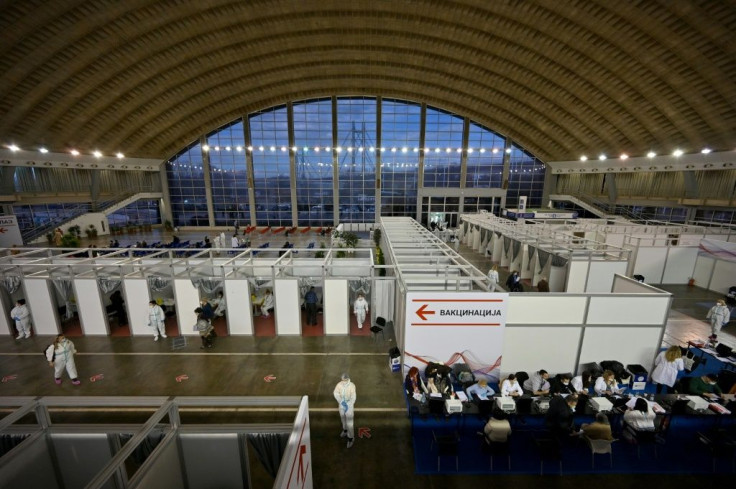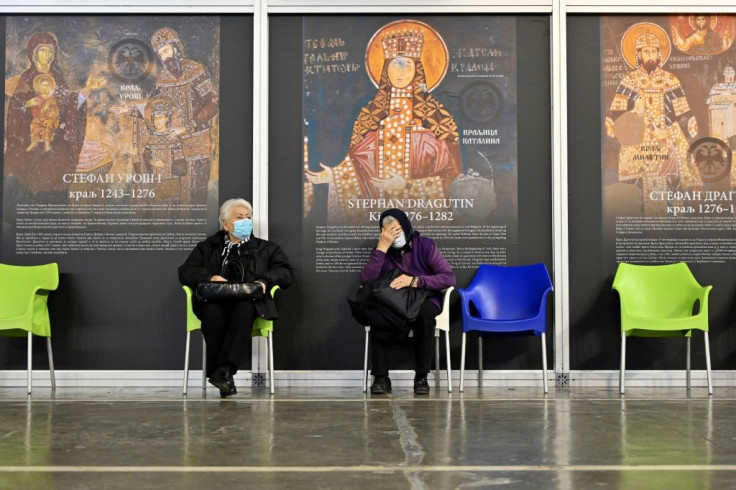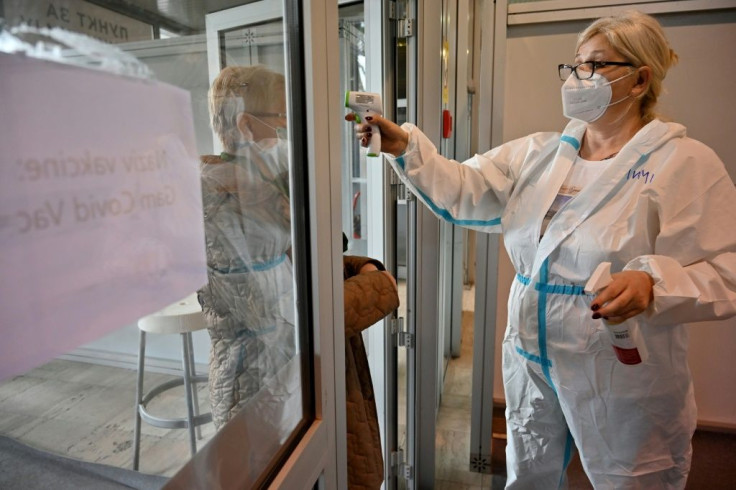With China's Help, Serbia Overtakes EU In Vaccine Rollout
Inside the dome of Belgrade's concrete fair hall, dozens of nurses in hazmat suits inject Covid-19 shots into young and old alike, working with an efficiency that has turned Serbia into continental Europe's fastest vaccinator.
The small Balkan country has inoculated more than 450,000 of its population of seven million in almost two weeks, a rate that exceeds all other states in Europe apart from Britain, according to the scientific publication Our World in Data.
One key difference is that most of the vials are filled with a vaccine made by Chinese pharmaceutical giant Sinopharm.
As the European Union's rollout is snagged by delays and controversies, Serbia -- which lies outside the bloc's borders -- has raced ahead by turning its gaze to the East, securing deals with Chinese and Russian producers.
When registering for an appointment, Serbs can tick off their vaccine of choice -- the Pfizer/BioNtech, Sputnik V and Sinopharm jabs are currently on the menu.

Yet it is the latter Chinese-made vaccine that is making up the lion's share of injections after Serbia received a one-million-dose shipment in mid-January that kicked off its mass immunisation campaign.
Serbian President Aleksandar Vucic, a populist leader who does not miss the chance to cast himself as the hero in a crisis, has framed the vaccination success as the fruit of his personal friendships and diplomacy.
"I wrote to Xi Jinping in October, and the price was drastically lowered", Vucic told local media of the "good deal" he struck with his Chinese counterpart for the Sinopharm vaccine.
"When you see the price, you'll erect a monument in my honour one day," he added.

After arriving at the vaccination centre in the capital, patients receive a quick medical check-up before following red arrows along the floor to a registration zone and then a row of booths where they receive the jab.
Not including the short wait afterwards to monitor for any adverse reactions, visitors can be whisked through the process in 15 minutes.
In a country better known for the soul-crushing pace of its bureaucracy, the smoothness of the nationwide vaccine rollout has been a surprise for some.
"Everyone knew exactly what they were doing, there was enough staff, all of them were kind", Snezana Krivokapic, a 38-year-old communications manager, told AFP after receiving her shot.
Apart from the batch of Chinese-made jabs, the Balkan country has also imported over 30,000 Pfizer/BioNtech vaccines and 40,000 Russian Sputnik V shots.

Vucic recently announced that Serbia's "friends" will send another one million doses before March, without revealing any details.
One pro-government tabloid summed it up in the following headline: "Vucic, Putin and Xi are saving Serbia".
Such a narrative is playing out as the EU faces accusations of neglecting its Western Balkan neighbours in the vaccine race.
Aside from Albania, Serbia is the only country in the region to have started immunisation thanks to its own deals with pharmaceutical companies.
Elsewhere, Western Balkan governments were left out of the EU's December vaccination rollout and are still waiting for shots promised to them through the COVAX mechanism, a pooling initiative set up to help poorer countries.
China was also cast as succeeding where the EU failed at the start of the pandemic, when Serbia gave wall-to-wall coverage of China's quick shipment of masks and other equipment while paying little attention to similar EU aid.
Beijing and Belgrade have become increasingly close in recent years, turning Serbia into key foothold for China's economic projects and influence in Europe.
It has also left Belgrade indebted to Beijing for a series of infrastructure loans, leading Serbian analyst Stefan Vladisavljev to raise the question of what was offered in exchange for the vaccine doses.
"Considering the nature of their cooperation over the last decade... we can conclude that Serbia must have done some math in order to secure this shipment," he told AFP.
For its part, Beijing is also motivated to "position themselves as global leader in fight against Covid-19," he added.
Inside the EU, neighbouring Hungary is the only member state to break rank to approve both Chinese and Russian-made vaccines, claiming to have ordered five million doses of Sinopharm's jab.
Hungary's Prime Minister Viktor Orban recently hailed Serbia's "inspiring example" -- and called the country a "laboratory" to see how the Sinopharm jab plays out.
Sinopharm says its vaccine, which is named Velo and uses an inactivated virus, is 79 percent effective, though Western sceptics note a lack of transparency and data from clinical trials.
Dragana Milosevic, a Serbian doctor helping lead the vaccination in Belgrade's fair hall, says they have been injecting up to 2,000 citizens daily with the jab without a hitch.
"There have been absolutely no side effects so far," she said.
© Copyright AFP 2024. All rights reserved.





















